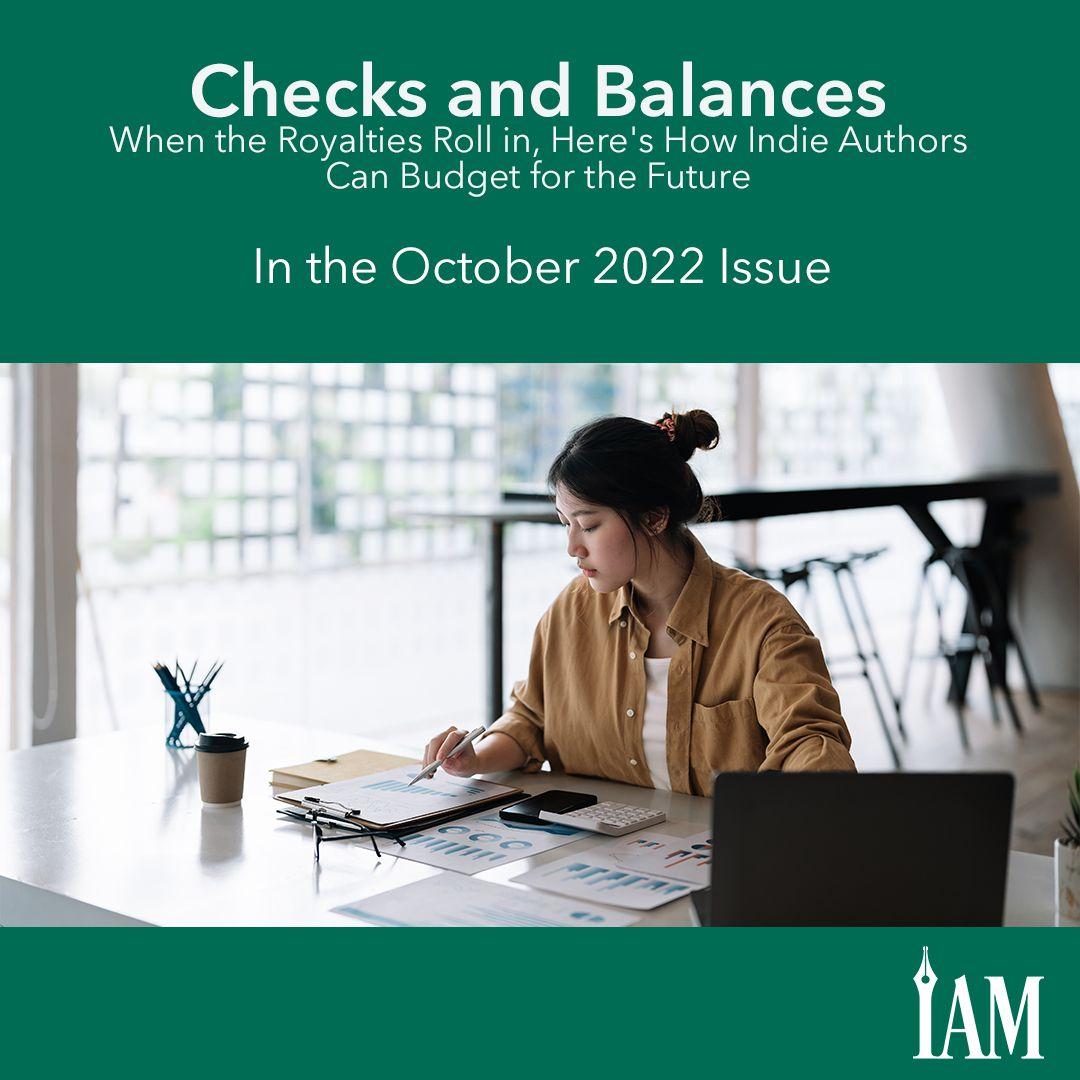When the Royalties Roll in, Here’s How Indie Authors Can Budget for the Future
Nicole Schroeder
June 2022 was a record-setting month for the United States economy—and not in the way anyone was hoping. A combination of factors, including the COVID-19 pandemic, Russia’s invasion of Ukraine, and continuing supply-chain shortages, drove the country’s inflation rate to 9.1 percent, the highest seen in forty years. And we’re not alone. Other countries around the world have also experienced rising inflation rates this year, according to Statista, for many of the same reasons.
For a number of people, the trend has reiterated a need to monitor spending now in order to save for tougher months down the road. It can be an important practice for anyone, but especially for those who are self-employed or manage small businesses, writes Mari Ramirez, owner of Open Bookkeeping, a full-service accounting firm in Austin, Texas. Whether the client is a startup with an initial investment or an individual’s self-managed business, Ramirez has seen a variety of companies drain funds quickly simply by not tracking their finances. "There are plenty of reasons why businesses fail; one of the biggest I see is (not) planning and budgeting."
Whatever goals you have for your author business, reinvesting in yourself and your work will help you understand where you are now as well as develop more clear goals for the future, according to the Better Business Bureau. Consider it another way: You can be a "pantser" when writing, but you shouldn't be one when it comes to finances. Don’t let this outline stress you out too much, though—before you break out the spreadsheets and calculators, we have a few tips for you to keep in mind.
Keep Your Books Balanced
Before you worry about dividing your funds to save, invest, or spend, you need to know your current money situation. That means balancing your books—and no, not the ones on your shelf.
Beyond just keeping track of your earnings each month, a profit and loss statement can help you understand your business’ net income over a set time period, and a balance sheet can help you calculate the assets and liabilities—cash or inventory and debts—of your business at a particular moment, according to the US Small Business Administration (SBA). The simplest versions of the statements sort and label income streams and expenses within a given time frame—these SCORE profit and loss statement and balance sheet templates, found on the SBA website (https://sba.gov), can be a good place to start.
First, decide how often you’d like to evaluate your funds—monthly, quarterly, or annually, for example—but consider a time span that evenly divides a year and reflects how often you release new titles. A shorter evaluation window can help you understand cash flow trends and track the success of new business strategies, such as an additional marketing tactic or new ad campaign, but a longer window that stretches from one release until the next will incorporate the ebb and flow of new sales and provide a better sense of your overall financial situation.
Pro Tip: If you’re an author in the United States, also consider how often you calculate and pay taxes. If you pay taxes quarterly, for instance, it will be easier to examine your business’ income and expenses on the same schedule.
As you begin to track your earnings and expenses, be thorough: Include the cost of editors, covers, ads, and other production costs, but also include annual software subscriptions, office supplies, and business development expenses, such as conferences or writing workshops you attend. Also keep in mind that your net income won’t always equate to your current cash balance—what you have in the bank at the current moment, Ramirez writes. "Net income ties to the balance sheet and cash is only one part of the balance sheet, so it doesn't give you the entire picture." Although knowing your net income will be important to understanding the health of your business, both numbers will play into how you construct goals and budget for future investments.
The ‘50-30-20’ Method
Once you understand how much money you regularly spend and receive, it’s time to develop a budget based on the results. Your process should be reasonable to understand and maintain long term, so choose the method that works best for you—and if you’re unsure what that might be, the “50-30-20” method could be a good place to start, according to CNBC and the Creative’s CFO, a financial resource for entrepreneurs.
The budgeting method, popularized by Senator Elizabeth Warren in her book All Your Worth: The Ultimate Lifetime Money Plan, separates profits on a monthly basis according to percentages of one’s profit. The way those amounts are allocated varies based on whether the budget is meant for one's own earnings or for a business. For the latter, professionals at Creative’s CFO recommend assigning 50 percent to your personal salary, 30 percent to taxes, and the remaining 20 percent to saving and/or reinvesting in your business. For an author, that could include a re-release with updated covers, new merchandise for fans, or even a ticket to that writing retreat you’ve been eyeing.
From there, consider taking a portion of the money to form an additional rainy day fund. According to the investment service Motley Fool, emergency savings can be just as important for businesses as they are for individuals, providing security in case of natural disasters, tougher economic environments, or other unforeseen circumstances. Keep the money separate from other long-term savings, according to Motley Fool, so as not to deplete your emergency funds when making a planned investment or your business’ nest egg during financial hardship. Even if you end up needing to dip into your long-term savings account, your emergency funds will help provide extra security and ideally mean less stress on your shoulders during challenging times.
Time Is Money
However you decide to budget, keep your process simple. Your time is valuable as an author, as it is with any business, and managing your finances shouldn’t be so complicated that it takes away opportunities to earn more.
As you organize your finances, consider keeping business earnings and expenditures in a separate account from your personal savings. The shift will make keeping track of your income easier, including for tax documents, according to Publisher’s Weekly, and will save time as you calculate future profit and loss statements. You don’t even need to wait until you meet your local bank’s qualifications for a business account. Some online payment processors, such as PayPal or Square, can serve as safe places to store funds without a minimum balance while offering similar features to a business checking account.
Finally, whatever process you decide for budgeting your business earnings, be flexible. "Reevaluating your budget and your goals is just as important as creating them to begin with," Ramirez writes. "See where you are falling behind or where you need to improve." As your earnings or expenses fluctuate over time, or as your business expands, your budgeting plan might need to adapt as well—by allocating more money toward savings, for example, or by decreasing the amount you pay yourself in better months in order to grow your emergency fund.
Fortunately or unfortunately, there’s no one right answer for how to budget, so find out what makes sense for your author business. Even if that involves hiring an accountant or other financial advisor down the line, Ramirez writes, simply organizing your payments and creating a professional plan for how to handle finances is already an important first step—one that can only benefit you. "I would say that money management is probably one of the most important things in knowing the health of a small business," she writes. "From your budget, you can create a plan for the future, not only for your business but for yourself."
Nicole Schroeder








